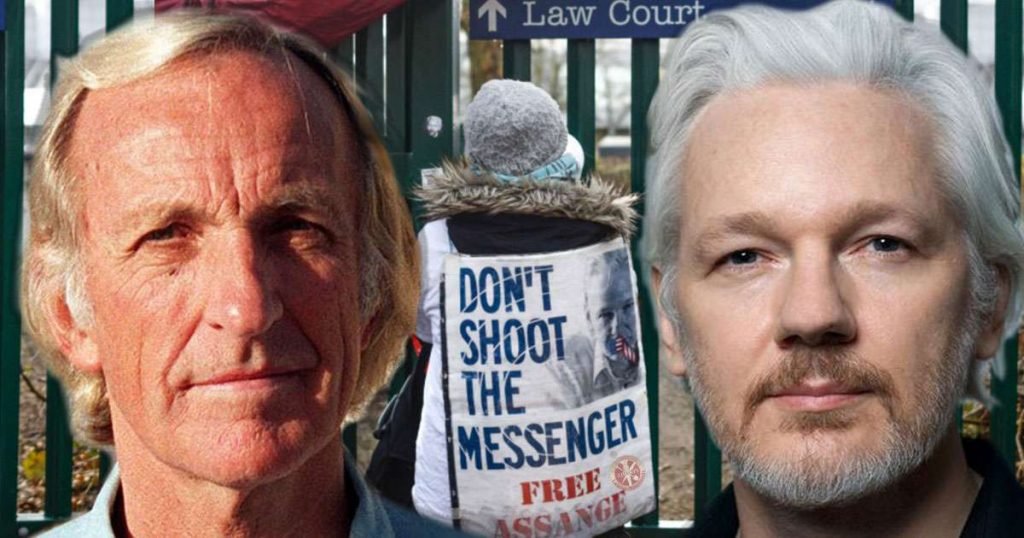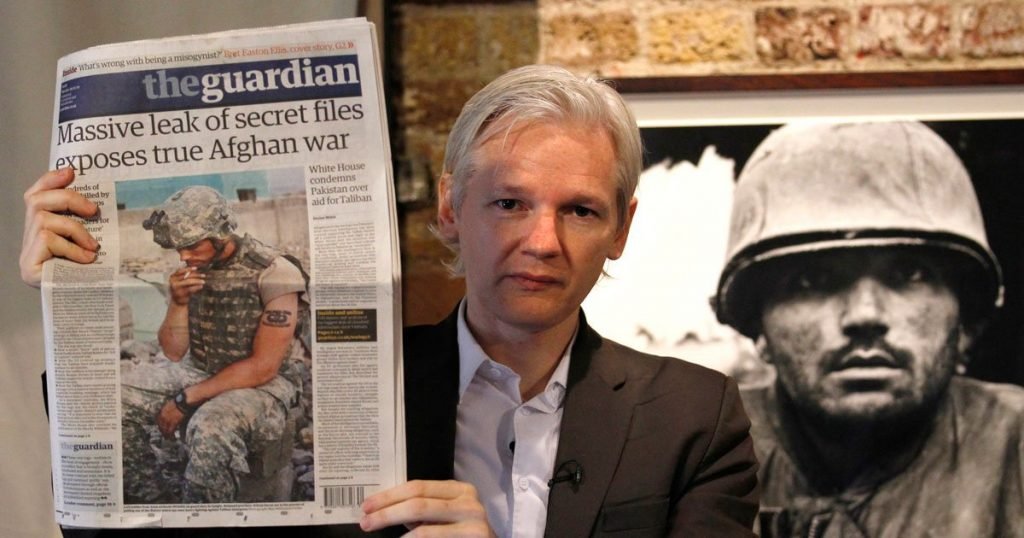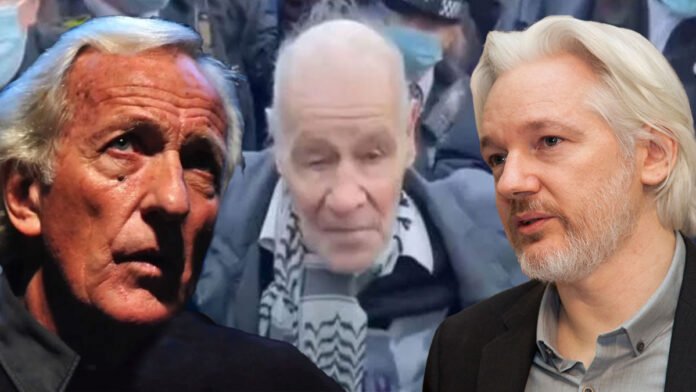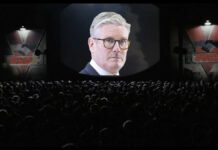The Price of Truth: Assange, Activism, and the Death of Journalistic Integrity
Ah, the sweet sound of justice’s rusty wheels finally creaking into motion! Julian Assange’s release from Belmarsh’s concrete embrace after 1,901 days is indeed a cause for celebration. But let’s not pop the champagne corks just yet, shall we? This victory, hard-won as it is, merely proves that if you bang your head against a brick wall long enough, eventually even the most obstinate of establishments might develop a migraine.
The journey to this day has been long and fraught with challenges. Assange and his family have endured unimaginable hardships – years of separation, constant fear, and the weight of a system determined to crush them. Yet, through it all, they persevered. The unwavering love and strength of his wife Stella and the support of his father John Shipton have been beacons of hope, carrying the voices of thousands around the world united in one aim: to #FreeJulianAssange
But the reality is Assange’s freedom, wrested from the clenched fist of state power, is less a triumph of the system than an indictment of it. It took nearly 2,000 days of relentless campaigning and countless protests.
As we reflect on this moment, we must remember that Assange’s freedom came at a great cost – not just to him and his family, but to all those who fought alongside him. It is a stark reminder of the price of telling truth to power in our world today. The mainstream media may have betrayed Assange, but individuals, campaigners, and small media outlets stepped up, willing to risk their own liberty to ensure his freedom.
This is more than just the story of one man’s release from prison. It is a narrative of collective strength, of a global community that refused to be cowed by threats and intimidation. It is a victory for all who believe in transparency, accountability, and the fundamental right of the public to be informed.
Julian Assange’s release isn’t just a victory; it’s a stinging indictment of our so-called democratic institutions. That it took the relentless efforts of grassroots activists to achieve what should have been a given in any society claiming to value press freedom is a damning testament to the state of our world. Consider Eric Levy, arrested at the ripe old age of 92 for daring to demand justice. Levy, who stood as a human shield against the Iraq War and never wavered in his support for Assange, represents the kind of moral backbone our spineless political class could only dream of possessing.
Alas, Eric Levy didn’t live to see this day, shuffling off this mortal coil at 94. But make no mistake – his story is now inextricably woven into the fabric of Assange’s struggle. Levy’s passing serves as a stark reminder of the human cost of this fight. While our leaders waxed lyrical about freedom and democracy, men like Levy spent their twilight years battling against the very tyranny those empty words were meant to prevent.
His death should ring in our ears like a clarion call, urging us to take up the mantle he so bravely carried. For if we allow Levy’s fight – Assange’s fight – to fade into memory, we consign ourselves to a future where truth is a luxury and justice a mere fairy tale.
Pilger’s Prophecy: How One Brave Australian Shook the Foundations of Power
The saga of Julian Assange isn’t just about one man; it’s a sprawling epic of intersecting lives and shared struggles. From Chelsea Manning’s courageous leaks to Edward Snowden’s daring exposés, from Jeremy Corbyn, George Galloway and Chomsky’s principled stand to Chris Hedges, Richard Medhurst, Caitlin Johnstone and Afshin Rattansi’s relentless reporting, this fight for truth and justice has drawn together a motley crew of rebels and truth-tellers. But towering above this pantheon of dissent stands the late, great John Pilger – a rare specimen of journalistic integrity in an era of media sycophancy – recognised in Assange a kindred spirit.
He saw what the chattering classes, content to regurgitate government press releases and corporate pablum, could not – or would not – see: a man willing to nail his colours to the mast of justice, consequences be damned.
In Assange, Pilger found a fellow traveller brave enough to rip away the velvet curtain hiding the grimy machinations of power. While most of his contemporaries were happy to play the role of stenographers to the powerful, Assange dared to show us the ugly truth behind the pretty lies. It’s no wonder the establishment trembled – and continues to tremble – at the mere mention of his name.
Assange dared to pull back the curtain on the grimy machinations of power.

In a speech he made in Sydney in 2011, defending WikiLeaks founder Julian Assange, John Pilger recalled how it was always impressed upon him when he was young that Australia was a brave country; that we stood up to authority and we stood up for justice. Such national myths were at best half-truths, Pilger said, but in our political life, there was scant evidence of this.
But now and then, an Australian came along who made such myths seem true. Julian Assange was such an Australian, he said.
Pilger went on to say in his speech:
“I find him an extraordinarily brave Australian. And I can’t say that about many of my compatriots in the same way. I’m not saying that there aren’t brave Australians, but I can’t think of any that has really been so unusually brave by his standing up to a superpower. Brave in starting a project like WikiLeaks that he knew would get him into trouble.
One of the things that, of course, almost has never come out of the generally appalling media coverage of Julian and WikiLeaks is the reason for WikiLeaks. It had a moral base. It was about justice. He nailed his colours and the colours of WikiLeaks to that mast.
This was going to be about justice. It was about seeking justice through letting people know what is going on, to letting people know what those who have power over their lives are saying. I can’t tell you how brave this is.
Many people have tried to do this and failed. Julian succeeded actually, because the information that he has got out to people all over the world has made a difference.”
The moral qualities that Pilger admired in Julian Assange also underpinned Pilger’s own journalism, serving as an inspiration for us all to aspire to.
Wikileaks and Weak Knees: How Mainstream Media Failed Assange

But let’s not delude ourselves into thinking this is some fairy tale ending. This victory, if we can call it that, has come at a grotesque cost. It has laid bare the festering hypocrisy at the heart of our so-called democracies – exposing a system so threatened by transparency that it would rather crush a man than face its own misdeeds. Assange’s ordeal serves as a stark warning: dare to challenge the narrative, and the full might of state brutality will rain down upon you. All this because we, the unwashed masses, had the temerity to believe that we have a right to know what atrocities are being committed in our name. How quaint of us to think that ‘freedom of information’ was anything more than a clever slogan dreamt up by our benevolent overlords to keep us placated.
The mainstream media, those self-proclaimed guardians of truth, revealed themselves to be nothing more than lapdogs to power, happy to yap at Assange’s heels while he languished in prison. It was left to independent voices and grassroots activists to carry the torch of real journalism.
As we savour this moment, let’s remember that Assange’s freedom is not an end, but a beginning. It’s a clarion call to all who still believe in the quaint notion of democracy. The fight for transparency, for accountability, for the simple right to know – it continues.
So yes, let’s celebrate. Let’s raise a glass to Julian Assange, to his family, to every soul who stood vigil outside Belmarsh or raised their voice in protest. But tomorrow, we must return to the barricades. For in this age of smoke and mirrors, of ‘alternative facts’ and state-sanctioned lies, the battle for truth is far from over.
As the great George Orwell once said, “In a time of deceit, telling the truth is a revolutionary act.” Assange’s release proves that revolution is still possible. The question now is: are we ready to carry it forward?
Support Independent Journalism Today
Our unwavering dedication is to provide you with unbiased news, diverse perspectives, and insightful opinions. We're on a mission to ensure that those in positions of power are held accountable for their actions, but we can't do it alone. Labour Heartlands is primarily funded by me, Paul Knaggs, and by the generous contributions of readers like you. Your donations keep us going and help us uphold the principles of independent journalism. Join us in our quest for truth, transparency, and accountability – donate today and be a part of our mission!
Like everyone else, we're facing challenges, and we need your help to stay online and continue providing crucial journalism. Every contribution, no matter how small, goes a long way in helping us thrive. By becoming one of our donors, you become a vital part of our mission to uncover the truth and uphold the values of democracy.
While we maintain our independence from political affiliations, we stand united against corruption, injustice, and the erosion of free speech, truth, and democracy. We believe in the power of accurate information in a democracy, and we consider facts non-negotiable.
Your support, no matter the amount, can make a significant impact. Together, we can make a difference and continue our journey toward a more informed and just society.
Thank you for supporting Labour Heartlands












